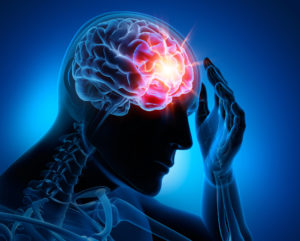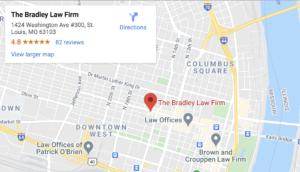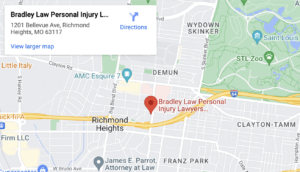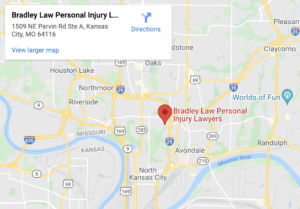
Brain injuries are common in personal injury cases. Sadly, brain injuries are more common than many people realize.
Our attorneys have over 30 years of legal experience assisting accident victims in recovering compensation, including brain injury victims. At Bradley Law Personal Injury Lawyers, we have helped our clients recover over $70 million in jury verdicts and settlements.
Contact our law firm at (314) 400-0000 for a free consultation with a St. Louis brain injury attorney to discuss your case.
Table of Contents
How Can Bradley Law Personal Injury Lawyers Help After a Brain Injury in St. Louis

Brain injuries are among the most serious personal injuries. They can result in debilitating conditions — and they can cost tens of thousands of dollars to treat. If someone else’s negligence caused your brain injury, you might be entitled to compensation. Our St. Louis personal injury attorneys can help you get every cent you deserve.
At Bradley Law Personal Injury Lawyers, we have over three decades of experience in personal injury law. We’ve helped countless individuals and families get back on their feet again after an accident in St. Louis. Our attorneys have recovered some of the largest awards in Missouri history for our clients. We want to devote that same commitment to you.
When you hire us, you can expect us to:
- Initiate an independent investigation into the cause of your accident
- Gather evidence and identify liable parties
- Calculate the full range of your damages, utilizing expert assistance
- Negotiate with the insurance company for a fair settlement
You deserve elite legal representation after your injury. Contact our St. Louis personal injury attorneys to get started on your claim today. We don’t charge any fees unless we recover money for you first.
How Common Are Brain Injuries?
The most recent brain injury statistics from the Center for Disease Control indicate that nearly 61,000 people died from traumatic brain injuries in 2019. In 2014, TBIs were diagnosed in almost 2.9 million emergency department visits, hospitalizations, and deaths. It is estimated that 13.5 million people live with a disability caused by a traumatic brain injury.
Men are at a higher risk of sustaining a brain injury compared to women. Senior adults 65 years and older have the greatest risk of being hospitalized and dying after a brain injury. Young adults (15 to 24 years) and very young children (birth to four years) also have high rates of traumatic brain injuries.
The direct and indirect cost of TBIs is estimated at $76.5 billion per year. Approximately 80,000 to 90,000 people each year experience the onset of long-term or lifelong disabilities caused by traumatic brain injuries.
Unfortunately, these TBI-related deaths and injuries are preventable.
What is a Traumatic Brain Injury?
A TBI or traumatic brain injury is a form of brain injury that occurs from sudden trauma. The symptoms of a TBI can range from mild to moderate or severe, depending on the level of damage.
A TBI affects how the brain works. Brain injuries can cause permanent impairments and lifelong disabilities. The severity of a brain injury generally determines the level of impairment.
Sadly, many brain injury victims experience health problems that last the rest of their lives. They may require long-term medical care and personal care. A brain injury during childhood can impact the child’s cognitive, physical, and emotional development.
What Causes Brain Injuries?
A brain injury may be caused by a blow, bump, or jolt to the head. Brain injuries can also happen when an object fractures the skull and enters the brain. This is known as a “penetrating injury.”
Common causes of brain injuries include:
- Falls (nearly one-half of the TBI-related hospitalizations are related to falls)
- Car accidents, including pedestrian accidents and bicycle accidents
- Child abuse and shaken baby syndrome
- Gunshots and other violence
- Motorcycle crashes
- Sports and recreational activities
- Blast injuries from explosions
- Commercial truck accidents
- Being struck by an object
- Whiplash caused by a fall or car accident
- Workplace accidents
Closed and penetrating head injuries can result in severe brain trauma. If you or a family member is involved in a motor vehicle crash or receives a blow to the head, prompt medical attention is the best way to prevent death and permanent impairment.
What Are the Symptoms of Brain Injuries?
The symptoms of a brain injury can depend on the severity and location of the injury.
Common brain injury symptoms include, but are not limited to:
- Loss of consciousness (not necessary for a brain injury to occur)
- Headache
- Nausea and/or vomiting
- Dizziness
- Ringing in the ears
- Blurred vision
- Confusion
- Bad taste in the mouth
- Issues with concentration, memory, thinking, or attention
- Changes in sleep patterns
- Mood swings or changes in behavior
- Loss of coordination
- Seizures
- Slurred speech
- Numbness or weakness in the arms or legs
- Larger than normal pupils
- Not being able to awake from sleep
Brain injury symptoms in children may also include refusing to play, being inconsolable, increased whining or crying, refusing to eat, and decreased development level.
If you notice any of the above symptoms or symptoms increasingly worsen, seek immediate medical attention.
What is the Treatment for a Traumatic Brain Injury?
It is wise to be checked by a physician after any brain injury to assess the level of brain damage. A physician conducts a physical examination and neurologic exam.
The doctor may also order one or more imaging tests, such as MRIs or CT scans. In addition, in some cases, the physician may order a neuropsychological test to assess brain functions.
Individuals with mild traumatic brain injuries may be directed to remain at home and rest. Over-the-counter pain relievers can help with the pain. The physician may advise that the person slowly returns to regular activity. Trying to do too much too soon could slow recovery and worsen the condition.
Individuals with moderate to severe traumatic brain injuries may require hospitalization. The medical staff monitors the person’s vitals and brain functions. Depending on the severity of the injury, brain injury treatments may include:
- Medications, such as anti-anxiety, anticoagulants, muscle relaxants, antidepressants, and stimulants
- Surgery to remove hematomas, relieve swelling and pressure, or remove dead brain tissue
- Rehabilitation therapy, including physical, occupational, speech, vocational, cognitive, and psychological therapies
The treatment of TBIs can be expensive. If the person sustains a permanent disability, the cost can total millions of dollars over the person’s lifetime.
Can I Recover Compensation for a Brain Injury?
If another person caused your brain injury, you could be entitled to compensation for your damages. The types of damages available for a brain injury may include:
- The cost of medical treatment and medications, including hospitalizations
- The cost of various vocational and rehabilitative therapies
- Counseling and mental health therapy
- The cost of personal care, in-home health care, and nursing home care
- The loss of wages, commissions, salaries, bonuses, benefits, and other forms of income
- A decrease in future earning capacity
- Mental, physical, and emotional pain and suffering
- Disabilities and impairments
- A decrease in the person’s quality of life or enjoyment of life
How much a brain injury claim is worth depends on several factors. A St. Louis brain injury lawyer works with medical experts, economists, and other experts to document the extent of your damages. These experts can also assist in placing a correct value on the past and future damages caused by your brain injury.
Contact Our St. Louis Brain Injury Lawyers for a Free Consultation
Have you or a family member sustained a brain injury? If so, you could be entitled to compensation for your injury, economic losses, and other damages. Contact our office today to discuss your case with a brain injury attorney in St. Louis. Learn more about your legal rights and options during a free consultation with an attorney.




